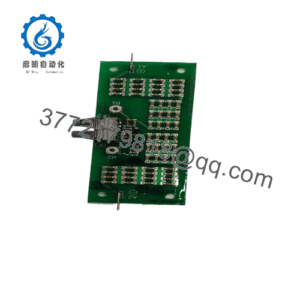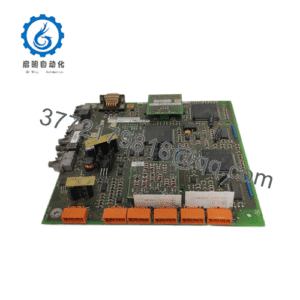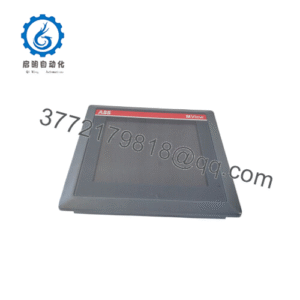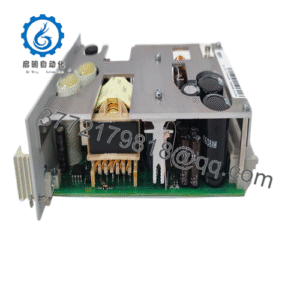Description
| Model Number | RDCU-12C |
| Brand | ABB |
| Type | Advanced Drive Control Unit |
| Input Voltage | 24 V DC (from drive power supply) |
| Operating Temp Range | -10 to 60 °C (14 to 140 °F) |
| Mounting Style | Integrated into drive assembly |
| Dimensions | 165 x 135 x 45 mm (6.50 x 5.31 x 1.77 in) |
| Weight | Approx. 420 g (14.82 oz) |
| Interface/Bus | RS485, Profibus DP, Ethernet/IP, Profinet |
| Compliance | CE, UL, cUL, IEC 61800-5-1, IEC 61508 |
| Supported Protocols | Modbus RTU/TCP, Profibus DP, Profinet, Ethernet/IP, CANopen |
| Typical Power Draw | 4.5 W |
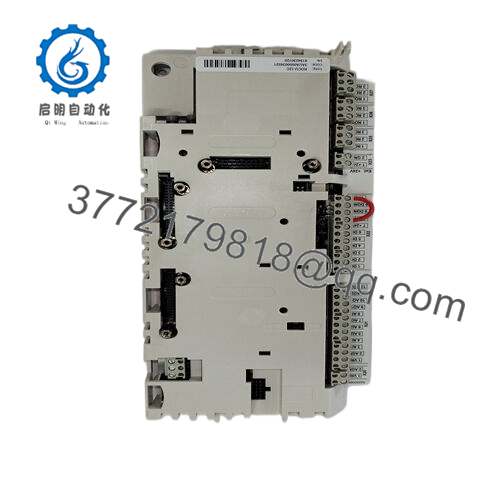
RDCU-12C
The ABB RDCU-12C serves as a powerful central control unit for ABB’s advanced industrial drives, orchestrating motor operations, processing high-speed feedback signals, and facilitating seamless communication with enterprise-level automation systems. Positioned at the heart of the drive architecture, it connects to power modules, multi-channel feedback devices (including resolvers and high-resolution encoders), and upper-level control systems to regulate speed, torque, and position with exceptional precision. The unit integrates flawlessly with ABB’s ACS880 and ACS6080 drive series, as well as third-party PLCs, SCADA systems, and cloud platforms through its enhanced communication interfaces.
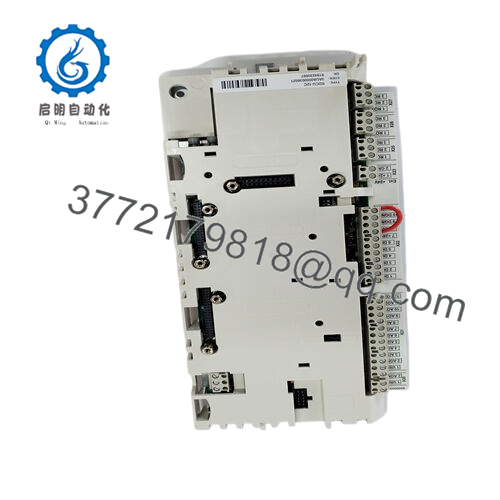
RDCU-12C
This connectivity enables real-time data exchange and remote monitoring, empowering engineers with comprehensive visibility into drive performance. The ABB RDCU-12C also features advanced control algorithms, including vector control and adaptive tuning, while its intelligent diagnostic system continuously analyzes operational data to detect anomalies, predict potential failures, and trigger proactive maintenance alerts.
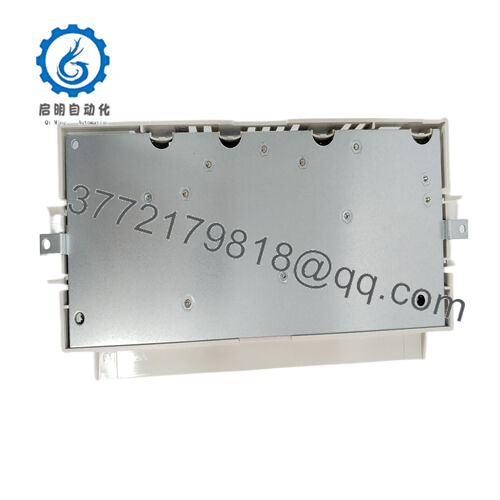
RDCU-12C
Main features and advantages:
Choosing the ABB RDCU-12C delivers substantial operational benefits to industrial drive systems. Its high-performance processor enables precise motor control with speed regulation accuracy up to 0.001%, making it ideal for applications where micron-level precision is critical—such as in CNC machining or semiconductor manufacturing. Unlike its predecessors, this unit offers expanded parameter customization, allowing engineers to fine-tune control strategies for specific load profiles, from constant torque to variable speed applications.
The module’s ruggedized design, including enhanced conformal coating and reinforced EMI/EMC protection, ensures reliable operation in harsh industrial environments with high electrical noise, temperature fluctuations, and vibration. Its multi-protocol industrial Ethernet support simplifies integration with Industry 4.0 initiatives and smart factory ecosystems, reducing integration time and enabling future scalability. For maintenance teams, the advanced diagnostic features provide detailed event logs, trend analysis, and remote troubleshooting capabilities, significantly reducing mean time to repair and minimizing unplanned downtime. Additionally, its energy optimization algorithms can reduce power consumption by up to 20% in variable load applications, driving long-term cost savings.
Application fields:
The ABB RDCU-12C excels in high-precision and large-scale industrial applications across diverse sectors. In automotive manufacturing, it controls servo drives in robotic assembly lines, ensuring precise movement control and consistent production quality. Its ability to handle high dynamic loads makes it ideal for heavy machinery applications, such as steel rolling mills and mining equipment, where it adjusts motor output to match varying operational demands while protecting equipment from overloads.
In renewable energy systems, such as wind turbines and solar tracking systems, the unit optimizes motor performance to maximize energy capture and efficiency. For precision processing industries like pharmaceuticals and electronics manufacturing, the ABB RDCU-12C provides the stable control needed for sensitive production processes, ensuring product consistency and compliance with strict quality standards. Its reliability in continuous operation makes it a critical component in mission-critical systems where even minor disruptions can lead to significant production losses.
Related products:
ABB RDCU-13C – Premium version with dual-core processor and enhanced safety features.
ABB RINT-5521C – Advanced interface module for 5G-enabled remote monitoring.
ABB ACS880-07 – High-power drive series optimized for RDCU-12C integration.
ABB PG-D203 – High-resolution encoder interface for precision motion control.
ABB FENA-21 – Advanced Profinet adapter withIRT (Isochronous Real-Time) support.
ABB DI820 – High-speed digital input module for expanded control capabilities.
ABB DO820 – High-current digital output module for auxiliary equipment control.
ABB MINT-5214 – Modbus to Ethernet gateway for legacy system integration.
Installation and maintenance:
Before installing the ABB RDCU-12C, verify compatibility with the target drive model (ACS880 and ACS6080 series) and ensure firmware versions are up to date for optimal performance. Confirm that the auxiliary power supply delivers stable 24 V DC with minimal ripple to prevent communication interference. Check wiring distances to feedback devices, as high-resolution encoders require shielded cables within recommended length limits to maintain signal integrity. Ensure the drive enclosure provides adequate ventilation, as the unit’s extended operating temperature range (-10 to 60 °C) still requires proper heat dissipation in high-ambient environments.
For ongoing maintenance, establish a monthly review schedule of diagnostic data and performance trends through connected HMI or cloud platforms to identify early warning signs. Inspect communication connectors quarterly, tightening terminals as needed—particularly in high-vibration applications. Perform firmware updates semi-annually using ABB’s Drive composer Pro software, scheduling updates during planned maintenance windows to avoid operational disruption. Calibrate feedback device interfaces annually to maintain precision control, and archive diagnostic logs for trend analysis and compliance reporting.
Other ABB product models:
ABB IDM-96
ABB IMCAM07B0000
ABB IMHSS03
ABB IMICV01
ABB IMRIO22
ABB INSUMMCU2
ABB IOR810
ABB IPFAN14
ABB IPMON01
ABB IPMON01
ABB IPS 21-35AD 3BHB017688R0001
ABB IPS21-24V-UL 3BHE032593R0001
ABB IPS21-35AD 3BHB017688R0001
ABB IPSYS01
ABB IRDH275-435
ABB IS200ERDDH1
ABB KPM-4LA41100102V1.2-KB2
ABB KSD211A101 3BHE024313R0101
ABB KSD211A101 3BHE024313R0101
ABB KSD211B 3BHE022455R1101
ABB KSD211B 3BHE022455R1101
ABB KUC711AE 3BHB004661R0001
ABB KUC711AE101 3BHB004661R0101
ABB LM80
ABB LM80.A
ABB LM80.SCP801-F810.LCD2.USBR.G800

 WhatsApp: +86 16626708626
WhatsApp: +86 16626708626 Email:
Email:  Phone: +86 16626708626
Phone: +86 16626708626